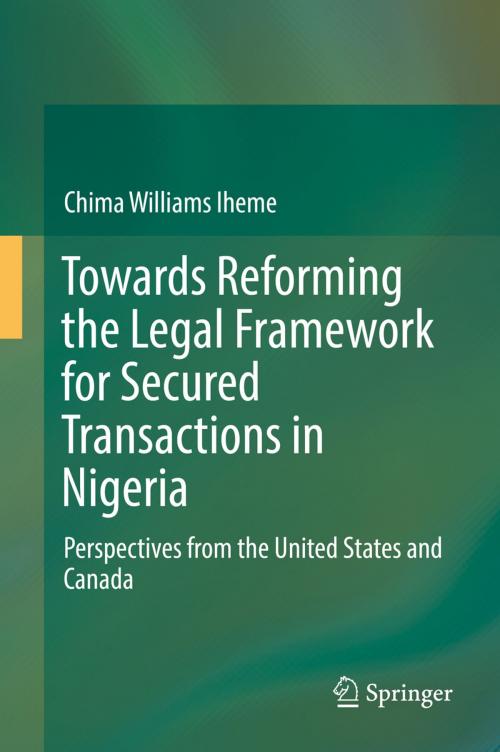Towards Reforming the Legal Framework for Secured Transactions in Nigeria
Perspectives from the United States and Canada
Nonfiction, Reference & Language, Law, International, Business & Finance, Finance & Investing, Banks & Banking| Author: | Chima Williams Iheme | ISBN: | 9783319418360 |
| Publisher: | Springer International Publishing | Publication: | August 16, 2016 |
| Imprint: | Springer | Language: | English |
| Author: | Chima Williams Iheme |
| ISBN: | 9783319418360 |
| Publisher: | Springer International Publishing |
| Publication: | August 16, 2016 |
| Imprint: | Springer |
| Language: | English |
This book offers a valuable guide to one of the most challenging areas of commercial law, now frequently referred to as secured transactions, with a focus on Nigerian, Canadian and United States perspectives. A debtor’s ability to provide collateral influences not only the cost of the money borrowed, but also in many cases, whether secured lenders are willing to offer credit at all. The book proposes that increasing access to, and indeed, lowering the cost of credit could tremendously boost economic development, while at the same time arguing that this would best be achieved if the legal framework for secured transactions in Nigeria, and of course, any other country with similar experiences, were designed to allow the use of personal property and fixtures to secure credit. Similarly, the creation, priority, perfection, and enforcement of security interests in personal property should be simplified and supported by a framework that ensures that neither the interests of secured lenders nor debtors are hampered, so as to guarantee the continuous availability of affordable credit as well as debtors’ willingness to borrow and do business. The book further argues that in addition to the obvious preference for real property over personal property by secured lenders due to the unreformed secured-transactions legal framework in Nigeria, its compartmentalized nature has also resulted in unpredictability in commerce and the concomitant effects of poor access to credit. Through the comparative research conducted in this book utilizing the UCC Article 9 and Ontario PPSA as benchmarks, the author provides reformers with a repository of tested secured-transactions law solutions, which law reformers in the Commonwealth countries in Africa and beyond, as well as the business community will find valuable in dealing with issues that stem from secured transactions.
This book offers a valuable guide to one of the most challenging areas of commercial law, now frequently referred to as secured transactions, with a focus on Nigerian, Canadian and United States perspectives. A debtor’s ability to provide collateral influences not only the cost of the money borrowed, but also in many cases, whether secured lenders are willing to offer credit at all. The book proposes that increasing access to, and indeed, lowering the cost of credit could tremendously boost economic development, while at the same time arguing that this would best be achieved if the legal framework for secured transactions in Nigeria, and of course, any other country with similar experiences, were designed to allow the use of personal property and fixtures to secure credit. Similarly, the creation, priority, perfection, and enforcement of security interests in personal property should be simplified and supported by a framework that ensures that neither the interests of secured lenders nor debtors are hampered, so as to guarantee the continuous availability of affordable credit as well as debtors’ willingness to borrow and do business. The book further argues that in addition to the obvious preference for real property over personal property by secured lenders due to the unreformed secured-transactions legal framework in Nigeria, its compartmentalized nature has also resulted in unpredictability in commerce and the concomitant effects of poor access to credit. Through the comparative research conducted in this book utilizing the UCC Article 9 and Ontario PPSA as benchmarks, the author provides reformers with a repository of tested secured-transactions law solutions, which law reformers in the Commonwealth countries in Africa and beyond, as well as the business community will find valuable in dealing with issues that stem from secured transactions.















